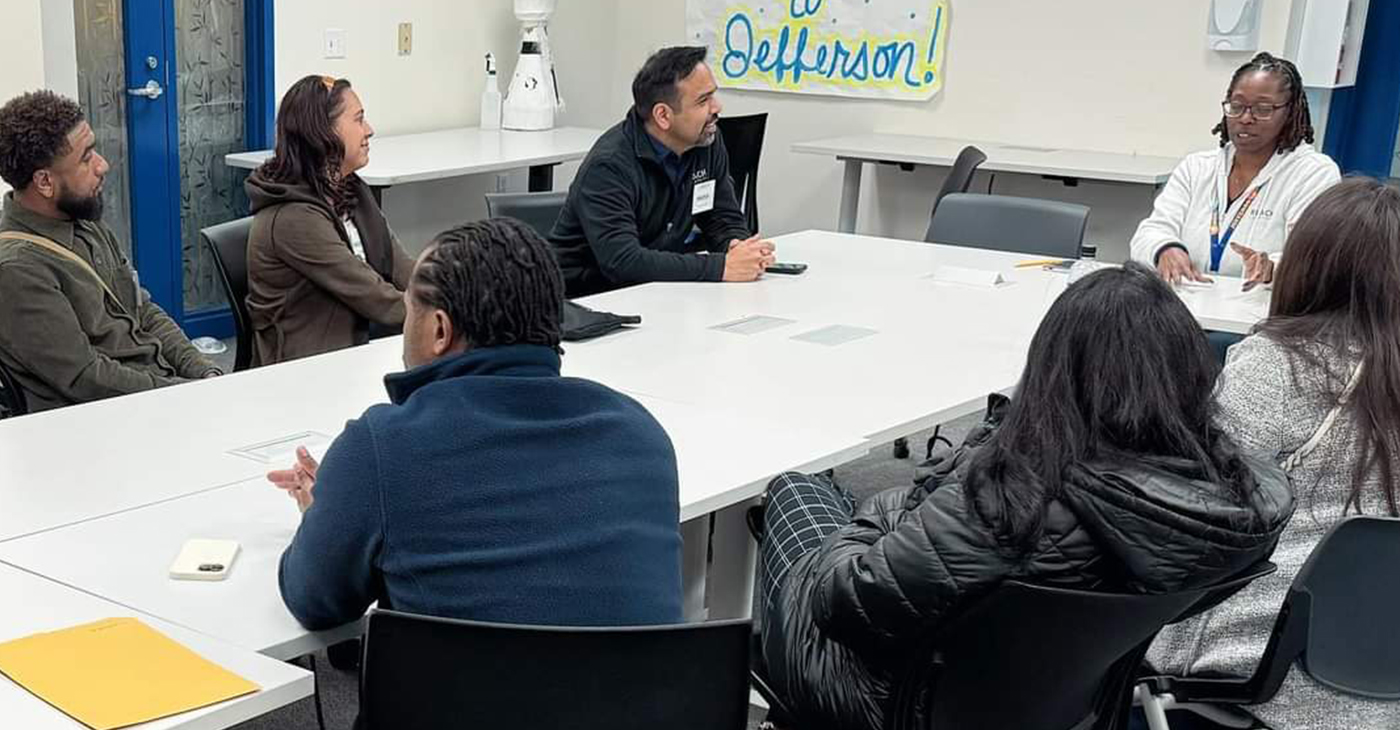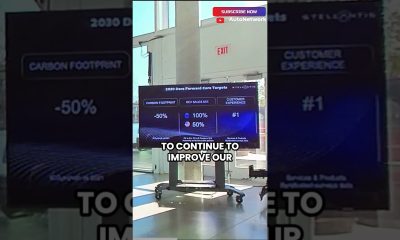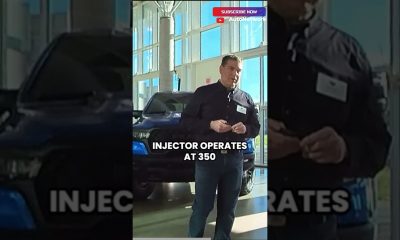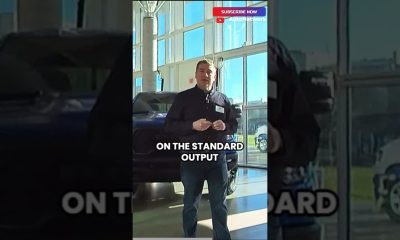Education
San Diego Libraries Offer Science Programs for Youth
SAN DIEGO VOICE — For the third year in a row, the San Diego Public Library (SDPL) will host a series of science-focused classes and workshops, part of a city-wide effort to prepare young people for careers in STEAM (science, technology, engineering, arts and mathematics) subjects.
By The San Diego Voice
For the third year in a row, the San Diego Public Library (SDPL) will host a series of science-focused classes and workshops, part of a city-wide effort to prepare young people for careers in STEAM (science, technology, engineering, arts and mathematics) subjects.
Spring into STEAM programs are offered for free to youth ages nine through 12. This year, the theme is Dive In! and libraries will offer programming in collaboration with local science experts and organizations including Microsoft, San Diego Coastkeeper, ThoughtSTEM and The League of Extraordinary Scientists and Engineers.
“There is no question about the importance of introducing STEAM concepts to youth as early as possible,” said Library Director Misty Jones. “At SDPL, we are offering programs throughout the entire library system so that all San Diego youth have an opportunity to participate. We are fortunate to have so many partners that want to help us achieve this goal.”
Classes and workshops will be held at all 36 libraries across the City during the months of March, April and May. There are six programs to choose from: Making Waves – learn about the science behind sea life and build your own watershed; Go Beneath the Waves with Minecraft – code your own aquatic environment using Microsoft technology; Hurricanes vs. Houses – learn how tropical storms come about and the impact on land and sea; Create-a-Creature – see how marine life has adapted over time; and Underwater Coding – learn coding using Scratch, a visual computer programming language
Program dates, times and locations are available on the library’s website: sandiego.gov/public-library/spring-into-steam. Advanced registration is required.
This article originally appeared in the San Diego Voice.
City Government
Vallejo Community Members Appeal Major Use Permit for ELITE Charter School Expansion
Vallejo community members, former Solano County judge Paul Beeman and his wife Donna Beeman, filed an appeal against the approval of the Major Use Permit for the expansion of ELITE Public Schools into downtown less than two weeks after the Planning Commission approved the permit with a 6-1 vote.

By Magaly Muñoz
Vallejo community members, former Solano County judge Paul Beeman and his wife Donna Beeman, filed an appeal against the approval of the Major Use Permit for the expansion of ELITE Public Schools into downtown less than two weeks after the Planning Commission approved the permit with a 6-1 vote.
ELITE Charter School has been attempting to move into the downtown Vallejo area at 241-255 Georgia Street for two years, aiming to increase its capacity for high school students. However, a small group of residents and business owners, most notably the Beeman’s, have opposed the move.
The former county judge and his wife’s appeal alleges inaccuracies in the city’s staff report and presentation, and concerns about the project’s exemption from the California Environmental Quality Act (CEQA).
The Beeman’s stress that their opposition is not based on the charter or the people associated with it but solely on land use issues and potential impact on their business, which is located directly next to the proposed school location.
The couple have been vocal in their opposition to the expansion charter school with records of this going back to spring of last year, stating that the arrival of the 400 students in downtown will create a nuisance to those in the area.
During the Planning Commission meeting, Mr. Beeman asked Commissioner Cohen-Thompson to recuse herself from voting citing a possible conflict of interest because she had voted to approve the school’s expansion as trustee of the Solano County Board of Education. However, Cohen-Thompson and City Attorney Laura Zagaroli maintained that her positions did not create a conflict.
“I feel 100% that the attorney’s opinion is wrong,” Beeman told the Post.
He believes that Cohen-Thompson has a vested interest in upholding her earlier vote as a trustee and is advocating for people to ratify her opinion.
Cohen-Thompson declined to comment on the Post’s story and Zagaroli did not respond for comment.
The Beeman’s further argue that the school’s presence in the commercial district could deter future businesses, including those who sell alcohol due to proximity to schools.
According to Alcohol Beverage Control (ABC), the department can deny any retail license located within 600 feet of a school. Only one alcohol selling business is located within that range, which is Bambino’s Italian restaurant at 300 feet from the proposed location.
The project’s proponents argue that the school would not affect current or future liquor-selling establishments as long as they follow the ABC agency’s guidelines.
The Beeman’s also referenced Vallejo’s General Plan 2040, stating that the proposed expansion does not align with the plan’s revitalization efforts or arts and entertainment use. They argue that such a development should focus on vacant and underutilized areas, in accordance with the plan.
The proposed location, 241 Georgia Street aligns with this plan and is a two minute walk from the Vallejo Transit Center.
The General Plan emphasizes activating the downtown with, “Workers, residents, and students activate the downtown area seven days a week, providing a critical mass to support a ‘cafe culture’ and technology access, sparking innovation and entrepreneurship.”
City staff recommended exempting the project from CEQA, citing negligible impacts. However, Beeman raised concerns about increased foot traffic potentially exacerbating existing issues like theft and the lack of police presence downtown. He shared that he’s had a few encounters with kids running around his office building and disturbing his work.
Tara Beasley-Stansberry, a Planning Commissioner and owner of Noonie’s Place, told the Post that the arrival of students in downtown can mean not only opportunities for surrounding businesses, but can allow for students to find their first jobs and continue to give back to the community in revitalization efforts.
Beasley-Stansberry had advocated for the students at the March Commission meeting, sharing disappointment in the way that community members spoke negatively of the teens.
“To characterize these children as criminals before they’ve even graduated from high school, that’s when I had to really take a look and I was kind of lost as to where we were as a city and as a community to where I couldn’t understand how we were viewing these children,” Beasley-Stansberry told the Post.
She added that the commissioners who voted yes on the project location have to do what is right for the community and that the city’s purpose is not all about generating businesses.
ELITE CEO Dr. Ramona Bishop, told the Post that they have worked with the city and responded to all questions and concerns from the appropriate departments. She claimed ELITE has one of the fastest growing schools in the county with mostly Vallejo residents.
“We have motivated college-bound high school students who deserve this downtown location designed just for them,” Bishop said. “We look forward to occupying our new [location] in the fall of 2024 and ask the Vallejo City Council to uphold their Planning Commission vote without delay.”
The Vallejo City Council will make the final decision about the project location and Major Use Permit on April 23.
Activism
Oakland Schools Honor Fred Korematsu Day of Civil Liberties
Every Jan. 30, OUSD commemorates the legacy of Fred Korematsu, an Oakland native, a Castlemont High School graduate, and a national symbol of resistance, resilience, and justice. His defiant stand against racial injustice and his unwavering commitment to civil rights continue to inspire the local community and the nation. Tuesday was “Fred Korematsu Day of Civil Liberties and the Constitution” in the state of California and a growing number of states across the country.

By Post Staff
Every Jan. 30, OUSD commemorates the legacy of Fred Korematsu, an Oakland native, a Castlemont High School graduate, and a national symbol of resistance, resilience, and justice.
His defiant stand against racial injustice and his unwavering commitment to civil rights continue to inspire the local community and the nation. Tuesday was “Fred Korematsu Day of Civil Liberties and the Constitution” in the state of California and a growing number of states across the country.
One OUSD school is named in his honor: Fred T. Korematsu Discovery Academy (KDA) elementary in East Oakland.
Several years ago, founding KDA Principal Charles Wilson, in a video interview with anti-hate organization “Not In Our Town,” said, “We chose the name Fred Korematsu because we really felt like the attributes that he showed in his work are things that the children need to learn … that common people can stand up and make differences in a large number of people’s lives.”
Fred Korematsu was born in Oakland on Jan. 30, 1919. His parents ran a floral nursery business, and his upbringing in Oakland shaped his worldview. His belief in the importance of standing up for your rights and the rights of others, regardless of race or background, was the foundation for his activism against racial prejudice and for the rights of Japanese Americans during World War II.
At the start of the war, Korematsu was turned away from enlisting in the National Guard and the Coast Guard because of his race. He trained as a welder, working at the docks in Oakland, but was fired after the bombing of Pearl Harbor in 1941. Fear and prejudice led to federal Executive Order 9066, which forced more than 120,000 Japanese Americans out of their homes and neighborhoods and into remote internment camps.
The 23-year-old Korematsu resisted the order. He underwent cosmetic surgery and assumed a false identity, choosing freedom over unjust imprisonment. His later arrest and conviction sparked a legal battle that would challenge the foundation of civil liberties in America.
Korematsu’s fight culminated in the Supreme Court’s initial ruling against him in 1944. He spent years in a Utah internment camp with his family, followed by time living in Salt Lake City where he was dogged by racism.
In 1976, President Gerald Ford overturned Executive Order 9066. Seven years later, the 9th Circuit Court of Appeals in San Francisco vacated Korematsu’s conviction. He said in court, “I would like to see the government admit that they were wrong and do something about it so this will never happen again to any American citizen of any race, creed, or color.”
Korematsu’s dedication and determination established him as a national icon of civil rights and social justice. He advocated for justice with Rosa Parks. In 1998, President Bill Clinton gave him the Presidential Medal of Freedom saying, “In the long history of our country’s constant search for justice, some names of ordinary citizens stand for millions of souls … To that distinguished list, today we add the name of Fred Korematsu.”
After Sept. 11, 2001, Korematsu spoke out against hatred and discrimination, saying what happened to Japanese Americans should not happen to people of Middle Eastern descent.
Korematsu’s roots in Oakland and his education in OUSD are a source of great pride for the city, according to the school district. His most famous quote, which is on the Korematsu elementary school mural, is as relevant now as ever, “If you have the feeling that something is wrong, don’t be afraid to speak up.”
Community
Teacher Mentoring Program Receives James Irvine Leadership Award
Leaders at Oakland-based Reach University, Dr. Elizabeth Baham and Héctor Camacho Jr, have been honored with the James Irvine Leadership Award for their work on addressing California’s teacher shortage through job-embedded curriculum and credential programs. With the award, each organization receives a grant of $350,000 and additional resources.

By Magaly Muñoz
Leaders at Oakland-based Reach University, Dr. Elizabeth Baham and Héctor Camacho Jr, have been honored with the James Irvine Leadership Award for their work on addressing California’s teacher shortage through job-embedded curriculum and credential programs. With the award, each organization receives a grant of $350,000 and additional resources.
Dr. Baham and Mr. Camacho, who have been at Reach for nine years and two years respectively, have been instrumental in attracting and recruiting future educators who otherwise would not have a clear and affordable path into teaching or leadership positions.
Established in 2006, Reach University has served as the nation’s first and only accredited nonprofit university, dedicated to advancing undergraduate and graduate degrees and credentials.
“To be recognized for this work so publicly, has given me more strength to keep [fighting] because it’s a lot of work. I’m super honored and appreciative of [the James Irvine Foundation] for giving me this new burst of energy because it’s a tough field,” Camacho said.
Baham echoed Camacho’s sentiments and is grateful that the work they are doing is being recognized by a larger audience.
“It’s an acknowledgement of the work that I’ve put in and it’s an acknowledgement that teachers matter, that education matters. I think that at the end of the day, people see both Hector and I representing Reach University and they walk away with a sense of teaching matters,” Baham said.
The university primarily partners with K-12 school districts to provide potential teacher candidates who specialize in subjects such as liberal arts, math, science of reading, and computer science.
Camacho, Dean of Admissions and SVP of Workforce Development, praised the university’s methodology in allowing candidates already employed in a school either part or full time, as a teacher-aides or paraprofessionals, to earn college credit while mastering the art of teaching.
Camacho highlighted the challenges that many face when seeking higher education, such as taking a break from school to work and afford their degree or going directly into college and amassing large amounts of debt to solely focus on their studies.
“Let’s honor and recognize the work that they’re doing in the schools right now. Give them some college credit and then give them the other coursework they need to finish it because we know you shouldn’t have to choose anymore,” Camacho said.
Students at Reach University are paid to earn a degree, and undergraduates take on zero student debt. After grants and institutional scholarships, the out-of-pocket contribution for all full-time undergraduate candidates is $900 per year, or $75 per month, with no student debt, according to Reach officials.
Half of the program candidates are made up of people of color, matching the demographics of the schools they are working in. The large majority are also first-generation college students and some from low-income backgrounds.
Baham, Provost & Chief Academic Officer, stated the importance of having educators of color in classrooms because it not only allows for students of color to see themselves in authority positions, but also integrates what the world looks like for those who are not surrounded by diversity in their everyday lives.
She added that diversity at all levels of academia results in success and encouragement for everyone to strive for more.
“It’s important for [students] to see us occupying spaces where they will want to see themselves,” Baham said.
Reach students are taught in group setting classrooms twice a week and through one-on-one mentoring to better assist with individual needs. This approach allows students to network with other classmates to problem-solve similar obstacles and receive personalized coaching to refine their teaching skills.
With job-embedded curriculum being the set form of learning for Reach, many of the students have a clearer transition from degree to career pipeline. 84% of California alumni are still in the classroom five years after completing the graduate program and nearly 91% are still working in a school.
Tysha Hayes, a Reach student, works as a bus driver for Jefferson Union High School District and part-time in the classroom as a part of her degree program. She entered the university in fall 2023 and is hoping to graduate by 2027.
Hayes shared that the non-traditional learning aspect of Reach is what drew her to enroll, as she herself has had an unconventional journey from being a bus driver for 27 years to pursuing a career in education.
The job allows Hayes to be involved in her students’ lives in a more personal way. She explained that her face is the first and last one they see on their way back and forth to school, often prompting them to share their classroom frustrations and struggles with her.
“The bus has been my classroom with the students, so I get the best of both worlds. I get to see them in different elements throughout the whole day,” Hayes said.
Post-graduation, Hayes intends to work in health and wellness so that she can help guide and assist students who are feeling overwhelmed or unmotivated in their education to work through their struggles and strive for more.
Hayes says although she got a late start in life, the prospect of building interpersonal relationships with her students in and outside the classroom excites her to keep working towards her degree.
-

 Activism4 weeks ago
Activism4 weeks agoOakland Post: Week of March 27 – April 2, 2024
-

 #NNPA BlackPress4 weeks ago
#NNPA BlackPress4 weeks agoFrom Raids to Revelations: The Dark Turn in Sean ‘Diddy’ Combs’ Saga
-

 #NNPA BlackPress4 weeks ago
#NNPA BlackPress4 weeks agoCOMMENTARY: D.C. Crime Bill Fails to Address Root Causes of Violence and Incarceration
-

 #NNPA BlackPress4 weeks ago
#NNPA BlackPress4 weeks agoCOMMENTARY: Lady Day and The Lights!
-

 #NNPA BlackPress4 weeks ago
#NNPA BlackPress4 weeks agoMayor, City Council President React to May 31 Closing of Birmingham-Southern College
-

 #NNPA BlackPress4 weeks ago
#NNPA BlackPress4 weeks agoBaltimore Key Bridge Catastrophe: A City’s Heartbreak and a Nation’s Alarm
-

 #NNPA BlackPress4 weeks ago
#NNPA BlackPress4 weeks agoBaltimore’s Key Bridge Struck by Ship, Collapses into Water
-

 #NNPA BlackPress4 weeks ago
#NNPA BlackPress4 weeks agoBeloved Actor and Activist Louis Cameron Gossett Jr. Dies at 87

















































